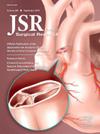一种新型贴片体外强化结直肠吻合器的实验研究
IF 1.7
3区 医学
Q2 SURGERY
引用次数: 0
摘要
吻合口漏(AL)是结直肠手术的一个严重并发症,与发病率、死亡率和医疗费用增加有关。技术进步尚未消除AL,其发生率为吻合术病例的5%至14%。本研究介绍并评价了一种新型的胶原-氰基丙烯酸酯贴片,用于结肠吻合口的外部强化,目的是抑制吻合口的渗漏。本研究的目的是评估一种新型胶原-氰基丙烯酸酯贴片在猪模型上加强结肠吻合的可行性和安全性。方法对12头长白×大白猪进行临床前试验。在先前验证过的吻合缺陷模型的基础上,在结直肠吻合处创建了一个21毫米的缺陷来模拟AL。猪被随机分为两组,一组接受胶原-氰基丙烯酸酯贴片加固,另一组不接受加固。评估安全性和可行性,分析贴片在结直肠结构中的整合。此外,作为次要结果,我们评估了临床监测、行为观察、炎症标志物血液检查和组织病理学分析。结果胶原-氰基丙烯酸酯贴片贴敷方便,有效粘附于肠表面,成功封闭缺损,愈合过程中可自然降解。实验组和对照组在狭窄或粘连方面没有明显差异,尽管炎症和感染性标志物有轻微变化。所有动物的存活率均为100%,未观察到AL的临床症状。结论胶原-氰基丙烯酸酯贴片的应用是可行的、安全的,临床效果良好,在预防结肠AL方面具有良好的应用前景,其疗效有待于进一步的吻合口漏模型研究或临床研究来证实。本文章由计算机程序翻译,如有差异,请以英文原文为准。
Results of a New Patch to Externally Reinforce Colorectal Anastomosis: An Experimental Study
Introduction
Anastomotic leak (AL) is a serious complication in colorectal surgery, associated with increased morbidity, mortality, and healthcare costs. Technological advances have yet to eliminate AL, which occurs from 5% to 14% of cases involving anastomosis. This study introduces and evaluates a new collagen-cyanoacrylate patch designed to externally reinforce colonic anastomoses with the aim to contain anastomotic leaks. The objective of the study is to evaluate the feasibility and safety of a novel collagen-cyanoacrylate patch to reinforce colonic anastomosis in a porcine model.
Methods
A preclinical study adhering to Good Laboratory Practices was conducted on 12 Landrace x Large White pigs. Following a previously validated model for a deficient anastomosis, a 21-mm defect was created at a colorectal anastomosis to simulate an AL. Pigs were randomized to receive either reinforcement with the collagen-cyanoacrylate patch or no reinforcement. Safety and feasibility were assessed, analyzing the integration of the patch in colorectal structures. In addition, as secondary outcomes, we assessed clinical monitoring, behavioral observations, blood tests for inflammatory markers, and histopathological analysis.
Results
The collagen-cyanoacrylate patch was easily applied, adhered effectively to the bowel surface, successfully sealed the defect, and was naturally degraded during the healing process. No significant differences in stenosis or adhesions were observed between the experimental and control groups, although minor variations in inflammatory and infectious markers were noted. All animals exhibited a 100% survival rate, and no clinical signs of AL were observed.
Conclusions
The use of collagen-cyanoacrylate patch is feasible, safe, and has good clinical outcomes, showing promise in preventing colonic AL. Further studies using an adequate anastomotic leak model or clinical studies are needed to confirm efficacy.
求助全文
通过发布文献求助,成功后即可免费获取论文全文。
去求助
来源期刊
CiteScore
3.90
自引率
4.50%
发文量
627
审稿时长
138 days
期刊介绍:
The Journal of Surgical Research: Clinical and Laboratory Investigation publishes original articles concerned with clinical and laboratory investigations relevant to surgical practice and teaching. The journal emphasizes reports of clinical investigations or fundamental research bearing directly on surgical management that will be of general interest to a broad range of surgeons and surgical researchers. The articles presented need not have been the products of surgeons or of surgical laboratories.
The Journal of Surgical Research also features review articles and special articles relating to educational, research, or social issues of interest to the academic surgical community.

 求助内容:
求助内容: 应助结果提醒方式:
应助结果提醒方式:


